They say a workspace says a lot about one’s personality. Going by that, it’s a no-brainer to find a nature lover, a patron of handicrafts, a wanderluster and an immensely hospitable person in Prof. Dipti Misra Sharma, head of the Language Technologies Research Centre. In our ‘Know Your Professor’ series, we catch up with her and discover a lot more than what the obvious signs tell us. For instance, an unlikely feminist, and a bonsai hater with a strong sense of liberty and equality.
My gaze quickly takes in a table with variously shaped cacti before settling on a row of potted plants that bask in the sunlight streaming in through the glass facade of Prof. Dipti Misra’s office. A plant lover, one may say. But she likens it to a vice. “Greed is when you cannot resist something you see and you want to accumulate it. I do that with plants! Wherever I go, I bring back 2-3 plants,” she says with a deep-throated chuckle. As if noticing me take in the overgrowth in some of the pots, Prof. Dipti continues, ”I cannot discard them. I don’t like to prune and trim them too much either. I feel they should be allowed to grow the way they want.” Unfettered and free. It’s a theme that will dominate much of our conversation. It’s also the philosophy she subscribes to in her dealings with youngsters, both as a parent and as a teacher. Preferring to gently guide students while giving them the space to grow. And balking at the thought of constraining anyone and making them think exactly like her.
No doubt, the thinking has been inspired by the way she herself was brought up by her parents who gave her the liberty to make her own career decisions. Her foray into the field of Linguistics and the choices she made towards it are no less dramatic. “It was when I was in school and I was a voracious reader.. I came across an expression (which I don’t remember unfortunately!) that fascinated me. I told my father that I wanted to get into a field where I have to do only language and nothing else, because I want to understand it completely.” Prof. Dipti’s father who was an NCERT professor himself told her about the then emerging field of Linguistics. However, with Linguistics being available for study only at the Master’s level, she went on to first complete Sanskrit Honours at Lady Shriram College for her undergraduate degree. The reasoning behind the choice of Sanskrit was that India had a great tradition of Linguistics in Panini. “They didn’t teach us any Panini then though,” says Prof. Dipti a little disappointedly. But years later, after her Masters and PhD in Linguistics from Delhi University, her exposure to Sanskrit came in handy in understanding the way Paninian grammar can be applied to Computational Linguistics.
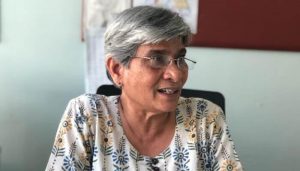
Linguistically Leading
It was when she was working in the University of Hyderabad in the Department of Hindi, introducing the course in Functional Hindi that she met the by-now legendary “team from IIT Kanpur”. The group, led by Prof. Rajeev Sangal, was working in Computational Linguistics and Machine Translation. Initial interactions piqued her interest which led to her eventually joining the team and later moving on to IIIT Hyderabad where the Language Technologies Research Centre was established. From pure Linguistics to Computational Linguistics? Difficult much? “Everyone in the team complemented each other very well. I learned a lot by working with others who had a Mathematical or Computer Science background. I don’t think I found it challenging. What I found interesting was the challenge that the area itself has!”, exclaims Prof. Dipti. She credits the institute with never making her feel out of place despite the absence of formal credentials in information technology. “I think this is special to IIITH. I’m a linguist heading a (Language) Technology Research Centre.”
Tree Bank Resource
While an overwhelming number of online resources are typically found for English and other Western languages, Prof. Dipti’s area of focus for long has been on developing similar resources for Indian languages. Machine translation from English to Indian languages and Indian to Indian languages has been her forte. “I feel really glad that I have contributed something known as a tree-bank for Hindi and Urdu, manually annotated with linguistic features, corpora of sentences and so on, such that any machine learning system can use for learning and developing a model.” What currently fascinates her is the type of data that is emerging on various social media platforms. “I want my students to start cracking the problem of code-mixing that happens with Indian languages. Hinglish is just one of them.” The other area that she has begun to explore is multi-modality in language. “We are not limited to language in terms of speech anymore. It is a combination of speech, text and vision. The Computer Vision research centre is already working on it, and I’m interested in it as well.”
Change And The Constant
No chat with old-time faculty is complete without reminiscing about the early years. But rather than guise her laments as fond memories, Prof. Dipti exudes positivity. She focuses on what, in her opinion, has remained unchanged over decades at IIITH. “Hopefully what will remain the same is the work environment. The competitive spirit that you find elsewhere where people don’t share ideas with each other, don’t talk much to each other and indulge in politics behind each other’s back – is not here in IIITH. And I have been there for 20 years now. And if it is not here for 20 years, hopefully it will not come here ever.” But what of the changes? “Many more people now. So many more views and opinions. But that is healthy anyway.” A change she’s still coming to terms with though is the reduced level of interpersonal interactions. For her, it’s not just the UG students shying away from faculty, preferring to either engage with their own peers or worse, with gadgets, but also the overall way of interacting over emails and chats rather than walking into one’s office, that needs getting used to.
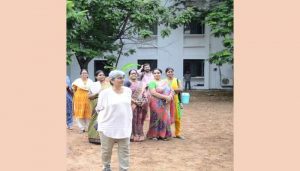
Whither Womanhood?
What Prof. Dipti is visibly excited about is the recent announcement of a separate admissions channel by the institute to ensure at least 25% of its UG student intake are girls. Her gentle demeanor and maternal disposition successfully mask many fronts she has. Like her engagement with Feminism which goes back to her years in college. Calling it an initial curiosity which later morphed into a discomfort at the sight of fewer women in places of high academic excellence, Prof. Dipti says she often wondered, “How come we have so many central and top universities, so many IITs and yet in so many years, not a single one of them has been headed by a woman? And it’s not that there were no women scientists, and scholars of repute.” At the institute level, the announcement means that as a first step, more girls need to gain admission at the UG level. But the gentle professor adds that it’s not just girls, but a diverse population from diverse sections of society that the institute seeks. “Diversity is important because we then understand things from different perspectives”. For the naysayers who label the Diversity channel of admission as quota in a different garb, she has this to say, “It’s necessary to set aside a dedicated channel of admission because we need sufficient representation of that section as well, which currently doesn’t exist. As for compromising on merit, we are taking only those from a certain level of JEE ranks. This is to ensure that anyone who comes here is ready to face the academic rigours that IIITH entails. Or else it will be very unfair for the students coming in.”
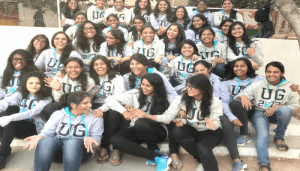
With Students, For Students
What many don’t know is that she has always been a vocal champion of having a curfew-less regime for students on campus. Conscious and aware of the fact that such a policy may actually hinder the institute’s efforts in attracting more girl students, she nevertheless states that the issue is non-negotiable. “When a student is coming out of school and entering the college or an institute at the UG level, they are at that age of transition from being a teenager to an adult. And this is an important stage in any individual’s life where they’re working things out. They will make mistakes, experiment and fail. We should give them space and the confidence that we trust them. That trust is important”. With such a laissez-faire approach, what are her views on cross-entry into hostels requested for by students? “As SAC chair, we are seriously considering having common spaces in hostels where students of either gender can come together to work, chat or hang out. Cross-entry into rooms has not been recommended because as a society, maybe we are not yet ready.” In addition to this, she hints at a proposal to have a gender-neutral hostel block that wasn’t outrightly rejected either. “I think it’s important to create a kind of space where gender does not matter. Is the society ready for it? Maybe not. Are we an educational institute that sometimes has to take bold steps? Maybe yes.” Sometimes you need to be the change you want to see.
Eclectic Personality
Simple and instantly endearing to all, Prof. Dipti is also known for her sartorial style that eschews synthetic fibres of all kinds, embracing only the handwoven, natural fabrics. “I believe that If you want to feel comfortable in the Indian climate, then adopt cottons. I also believe that we should promote our handloom weavers and other artisans involved in the textile process. All these art forms will die out if we don’t buy and promote them.” She was one of the active members of a team that put in place an ethnic dress-code policy followed by the institute at graduation ceremonies. It was a vindication of sorts when the HRD Ministry early last year mandated a similar policy across all technical institutes. Ask her about her interests and without hesitation, she responds with a,”I love travelling and reading.” Gesticulating to the number of artefacts scattered on her desk, she mentions that she often picks up souvenirs from her travels across India and the world. Like a smooth, white stone doubling as a paper weight that she found in the Teesta river on her recent trip to Sikkim. Or the palm leaf hat worn by tea plantation workers from her trip to Manipal. And what of the wildlife posters dotting the office walls? A safari enthusiast perhaps? “No, I haven’t gone on one, but I would like to”.
As I turn off the recorder and continue to chat, more stories come tumbling out. Of how as a child, she always wanted a lion cub as a pet. The fascination stemming from the fact that besides being beautifully majestic, she looked upon it as a free animal roaming the natural wild, unconstrained. She talks about the same sense of freedom in herself that led her to cancel a bonsai workshop she had signed up for while visiting Japan. The thought of wilfully stunting a plant’s growth was too much to take, leaving her a bonsai-hater for life.
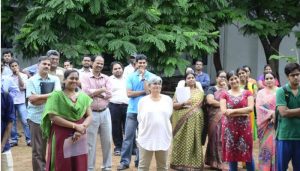


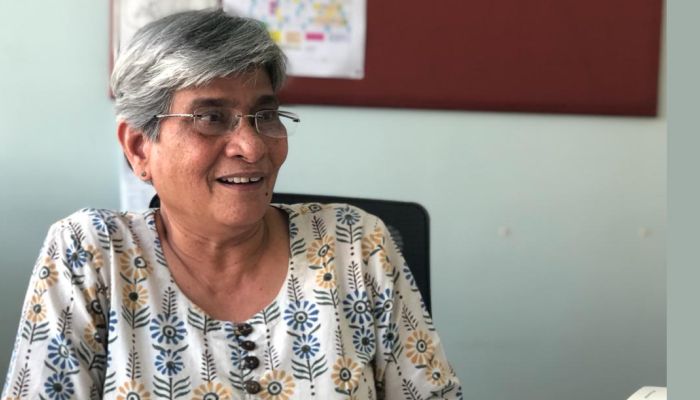
Next post